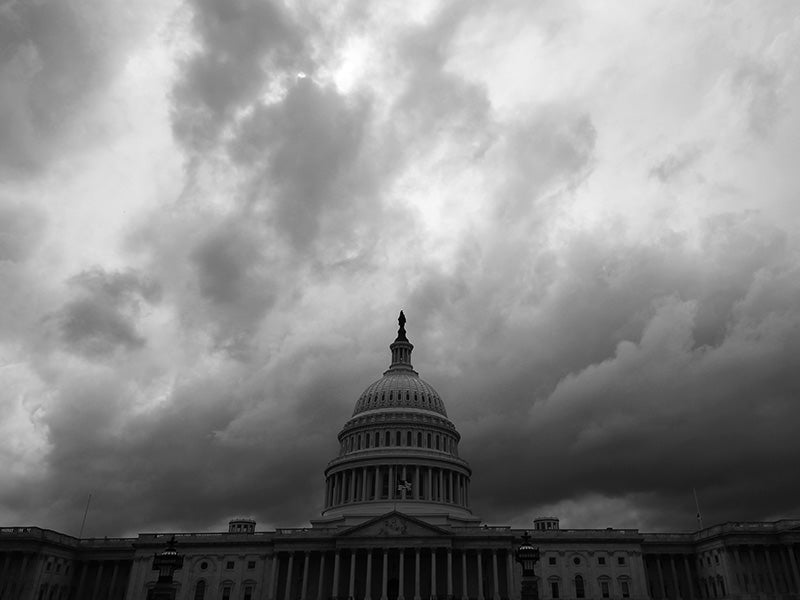What You Need to Know About the Debt Ceiling and Its Impacts on the Economy and the Environment
House Republicans brokered a dangerous deal to gut environmental laws and silence communities.
What is the debt ceiling?
The debt ceiling, also known as the nation’s debt limit, is the maximum amount of debt that the U.S. government is allowed to have. With Congress controlling the issuance of debt, they must consistently raise, suspend, or eliminate the debt limit to allow the government to continue borrowing money to meet its financial obligations. The debt ceiling has been raised or suspended 78 times since 1960, including three times under former President Donald Trump.
What’s the current situation with the debt ceiling?
We are fast approaching the current debt limit, and Congress must raise it so the government can continue to pay its bills. Treasury Secretary Janet Yellen recently stated that the government could run out of money as soon as June 5. President Biden and House Speaker Kevin McCarthy reached an agreement to raise the debt limit. But the deal comes with some terrible concessions, including draconian spending cuts and new requirements on social safety net programs, and will have major implications for the environment. Republicans are holding our country and economy hostage to advance an agenda that will sacrifice the wellbeing of millions for the benefit of billionaires and polluting industries.
The process was problematic from the start. It was all negotiated behind closed doors without input from experts in Congress and community leaders who know this issue best. It’s no secret the Speaker McCarthy is beholden to the most extremist members of his party, and this deal unfortunately bears their fingerprints
This is a case of history repeating itself, and we saw this the last time Republicans played politics with the debt limit in 2011. Their tactics put the United States on the precipice of default, resulting in higher borrowing costs to businesses and consumers, and dwindling retirement savings for countless Americans. But the Republicans were able to manipulate the rest of Congress to extract $1.3 trillion in major spending cuts that impacted the federal budget for almost a decade. During this time, federal funding for K-12 education, veterans’ benefits, federal rental assistance, and job training programs faced significant cuts. While this deal avoids the consequences of default, our climate is still in crisis and the most overburdened communities will continue paying the highest cost.
How does the debt limit deal impact the environment?
While the climate funding of the Inflation Reduction Act was protected, the deal still includes several harmful provisions that fundamentally change the National Environmental Policy Act (NEPA). These changes could make it easier to greenlight more fossil fuel and poorly-regulated mining projects while limiting the ability of people to have a say in the development projects built in their neighborhoods. The bill also paves the way for finishing the Mountain Valley Pipeline, entrenching reliance on fossil fuels in a region already overburdened by dirty energy development. It bypasses judicial processes and mandates permit approvals for the project, setting a dangerous precedent that will do enduring harm to Appalachian communities.
How would this deal impact NEPA?
For too long Republicans have used NEPA as a scapegoat for project delays, omitting their own complicity in leaving the agencies tasked with completing environmental reviews largely underfunded. This deal would codify provisions that Republicans hostile to NEPA have sought for years. These changes include:
- Instituting arbitrary one-size-fits-all timelines and page limits for environmental reviews that could result in rushed reviews for some of the largest infrastructure projects.
- Allowing project sponsors to write their own environmental reviews, potentially resulting in major conflict of interests.
- Dramatically broadens the use of “categorical exclusions” under NEPA by allowing federal agencies to adopt any categorical exclusion created by any of the over 80 agencies in the federal government, thus threatening to shield countless projects from public scrutiny and comment that would otherwise been subject to more robust review and disclosure.
These major changes could actually result in more litigation while disincentivizing the robust public engagement and analysis necessary to create successful and resilient infrastructure projects. This is not the framework we need as we embark on one of the most ambitious periods of infrastructure development in our nation’s history.
What happens if Congress doesn’t raise the debt limit?
According to the Department of Treasury, the United States is set to surpass its current debt limit on June 5. If Congress does not pass a bill raising the debt limit, the United States will default on its debt for the first time in history. While there is no crystal ball to predict the exact consequences, many global economists anticipate the economic impacts of default would be nothing short of catastrophic. Default could facilitate a recession with massive layoffs that could rival the impacts of the 2008 financial crisis. Additionally, the government would not be able to meet its financial obligations to creditors as well as paying federal workers and military personnel, issuing social security checks, and providing Americans with food and housing assistance.
Established in 1989, Earthjustice's Policy & Legislation team works with champions in Congress to craft legislation that supports and extends our legal gains.
Geoffrey Nolan
Public Affairs and Communications Officer, Earthjustice
gnolan@earthjustice.org
